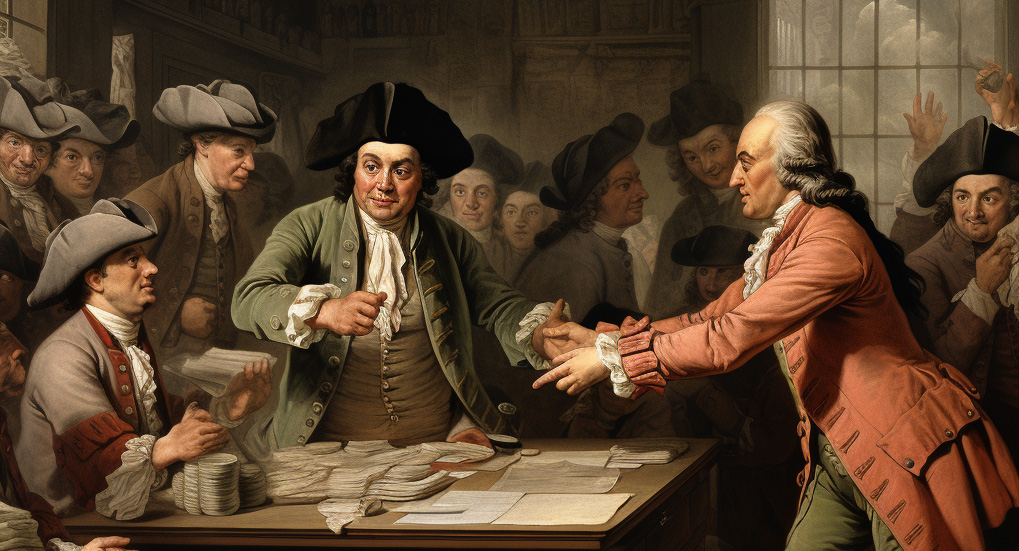
Taking the Temperature of the Times..
Leave your thoughtsSiring While Cowardly?
My summary, yesterday, of Philadelphia’s Dunlap’s Advertiser for February 4, 1777, reaffirmed a few old lessons and taught me a few new ones. First of all, when people go to war, most of the old rules are suspended. When the colonies declared themselves officially separated from England (and in a state of war), it became vitally important to know who is with you and who is ‘agin’ you. There is no “agreeing to disagree.” Both George Washington and Britain’s General Howe demanded oaths of loyalty, on pain of being imprisoned, banished to enemy lines, or worse. Given the consequences of making the wrong declaration, it’s difficult to know how anyone might trust such an affirmation. I think that’s why, ultimately, mere utterances weren’t enough. You wound up trusting the ones who took up arms with you.
[Period Comedy Sketch: The Jerseys in the fall of 1776, in a state of perpetual advance and retreat by the British, one day under British command, one day under American — a farmer takes a new oath of loyalty every other day, depending on circumstances]
In the Mood: (Mature audiences only). Years ago, a relation of mine seemed to blame a father we both knew for the delicate frame and timid demeanor of his son. I objected: “well, isn’t DNA a luck-of-the-draw kind of thing? A billion number permutation lottery between mom and dad?” My relative protested, “no, I think when you sire a child, you engage in a kind of divine forecast — you craft the child of your imagination.”
This contention was so completely novel to me, I didn’t pursue the conversation any further. It felt plain nutty.
But I’m wondering if my relative’s belief is rooted in some tradition of which we no longer speak. When Thomas Paine lamented the problem of cowardice in the face of the enemy, he admitted that some men have more fortitude and some less, but he laid the defect on the father’s doorstep. According to Paine, “We cannot alter nature, neither ought we to punish the son because the father begot him in a cowardly mood.”
Catch that? Is Paine saying our children are the product of dad’s “mood” at the time of conception? Are brave men born of a father feeling sort of courageous during, well..
A very cursory Google search doesn’t turn anything up. Has anyone written a scholarly article on the subject? Any clinical studies?
Jane: “What are you doing, dear?”
John: “Staring down the enemy.”
Jane: “I thought this was our night.”
John: “It is. It is. I just want to make sure, well, um, never mind..”
Take my Continentals, or else: The last two reviewed issues of Philadelphia papers indicates a problem with Americans being unwilling to take the new paper dollars in payment for goods and services. The problem became so pronounced that laws were passed demanding their acceptance, and anyone who refused would lose the entire amount of the transaction in question, with 2/3 going to the state and 1/3rd going to the informer as a reward.
Noah: “Do you still have those planks for sale?”
Edward: “I’m not selling anything at all right now.”
Noah: “But just yesterday, you offered me 4 dozen planks for one pound, 8 pence.”
Edward: “No. Not for sale.”
Noah: “But there they rest. I see them.”
Edward: “I’ve decided to use them myself.”
Noah: “How so? What will you make of them?”
Edward: (thinking) “A dance floor.”
Noah: “A dance floor? Are you avoiding the Continental dollar, sir?”
String Them Up: Paine makes reference to papers of Trenton-killed Hessian Colonel Johan Rall, referencing orders presumably from General Howe ordering his troops to hang any “inhabitant” found with arms and no officer. (“His excellency the commander in chief orders, that all inhabitants which shall be found with arms, not having an officer with them, shall be immediately taken and hung up.”) Enemy soldiers found under command of enemy officers are afforded prisoner of war status, in other words, but any householder who happens to have a fowling piece might not fare so well. I don’t know how, or whether, this brutal tool was used in practice, but it doesn’t seem the sort of option you would give a Hessian officer annoyed at the prospect of being so far from home. It’s not clear, either, whether the mere household possession of a firearm was enough to trigger a noose, or whether you had to be found carrying a weapon.
In any case, I remain perplexed by people who don’t learn anything from history. What do you think happens to a people who voluntarily disarm themselves?
Tags: Continental Dollars, Loyalty Oaths, SiringCategorised in: Distilled Spirits, Farm Journal
This post was written by Jim Riley
